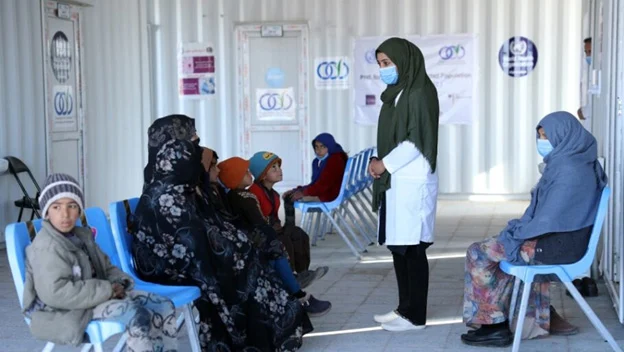Empowering women through improved health care in Herat
Afghanistan | 2024 | CBPF
Afghanistan, Herat province. On a cold winter morning, 21-year-old Shokria visited a WHO-supported health centre close to her home in Herat province, western Afghanistan. She waited with a dozen other women from the area to see a doctor and her name was called after a short wait.
Afghanistan grapples with a fragile healthcare system and unequal access to services. Funding is insufficient and there is a shortage of healthcare professionals, leading to disease and unmet primary care needs. To make matters worse, Shokria’s village in Injil district was directly affected by the earthquakes last October. Throughout the region, many houses were destroyed and several schools and health centres damaged.
“Since our houses are damaged, we have been living in tents or temporary shelters,” Shokria said. “With high winds, it can get very cold in my place.”
With funding from the Afghanistan Humanitarian Fund, WHO has set up eight health centres across four districts in Herat to provide vulnerable communities with critical health services. Before the centre opened, people had to travel far to access assistance. “I would have been forced to deal with my health issues by myself at home,” said Shokria. “The new health centre gives us all hope.”
Supporting quality care
The funding from AHF helped Herat Regional Hospital build up its stock of essential medicines and provide patients with high-quality care – including medicine and meals. The funding also supported training for dealing with mass casualty events like the earthquake.
Qamar was admitted to hospital with a broken leg and head injuries after an accident. “At this hospital, I received medication, food, and fruit. And there was no cost for me. I’m really happy with the service and the doctors.”
A hospital run by women for women
Run by women exclusively for female patients and their children, the Sakena Yakoobi Hospital in Herat provides essential gynecological and pediatric health care.
With funding from the AHF, the World Health Organization has been helping provide life-saving health care for 5,000-6,000 patients each month. “In just one year, this hospital has gained the trust of the community. This is because we consistently deliver quality health care,” explains Dr. Homa Niksiar, the hospital director.
Patients have noticed the high-quality care and spread the word to their friends and neighbors. Gamila accessed care here throughout her pregnancy. “A relative recommended it based on her own positive delivery experience. On her advice, I came here when I was three months pregnant and I followed up with check-ups. I was impressed by the quality of care and my doctor’s excellent communication, which made it easier to decide to have my baby here.”
Needs are huge
Dr. Faridoon Sultani, Regional Manager at the Organization for Community Coordination and Development (OCCD), WHO’s partner in Herat province, said health centres supported by WHO are functioning in eight earthquake-affected areas. “The health centres have professional staff and are supplied with adequate equipment and medicines. They see patients every day from morning till dusk,” said Dr. Sultani.
“With support from WHO, we have delivered essential health services in all the earthquake-affected areas during the first 100 days,” Dr. Sultani added. “The new centres will continue delivering healthcare in the earthquake-affected areas for three months now, but with high needs I hope we can continue to support them in the longer term.”
Original story: adapted from original articles by WHO EMRO and OCHA Afghanistan.
More information about the Afghanistan Humanitarian Fund
